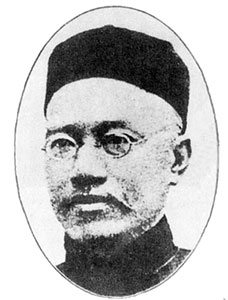LET’S LEARN A LITTLE BIT MORE ABOUT THE FIRST PERSON WHO DARED TO TRANSLATE ENGLISH INTO CHINESE.
 Yan Fu was a Chinese scholar and translator, most famous for introducing western ideas, including Darwin’s “natural selection”, into the eastern world in the late 19th century.
Yan Fu was a Chinese scholar and translator, most famous for introducing western ideas, including Darwin’s “natural selection”, into the eastern world in the late 19th century.
On 8, January, 1854, Yan Fu was born in Fuzhou, Fujian Province, China. In his early years, his father greatly encouraged him to obtain a high education and prepare for the Imperial examination. However, the death of his father in 1866 caused an abrupt change to these plans. A year later, Yan Fu entered the Fujian Arsenal Academy in Fuzhou, a Western school where he studied a variety of subjects including English, arithmetic, geometry, algebra, trigonometry, physics, chemistry, astrology and navigation. This was a turning point in Yan Fu’s life as he was able to experience first-hand contact with Western science, thus inspiring the enthusiasm that carried him through the rest of his career.
HIS OWN UNDERSTANDING AND TRANSLATION THEORY
Yan stated in the introduction of his translation of Evolution and Ethics that “there are three difficulties in translation: faithfulness, expressiveness, and elegance”. He did not set them as general standards for translation and did not say that they were independent of each other. However, since the publication of that work, the phrase “faithfulness, expressiveness, and elegance” has been attributed to Yan Fu as a standard for any good translation and has become a cliché in Chinese academic circles, giving rise to numerous debates and theses.
WORKS AND CONTRIBUTION
Yan Fu was one of the most influential scholars of his generation. He worked to introduce Western social, economic and political ideas into the Eastern world. Previous translation efforts had been focused mainly on religion and technology.
In 1895 he published Zhibao 直報, a Chinese newspaper founded in Tianjin by Constantin von Hannecken (1854-1925), which contains several of his most famous essays:
- Lun shi bian zhi ji 論世變之亟 (On the Speed of World Change)
- Yuan qiang 原強 (On the Origin of Strength)
- Pi Han 辟韓 (In Refutation of Han Yu)
- Jiuwang jue lun 救亡決論 (On our Salvation)
Yan Fu’s later works include:
- Evolution and Ethics Thomas Henry Huxley as Tianyan lun 天演論 (On Evolution) 1896-1898
- The Wealth of Nations by Adam Smith as Yuan fu 原富 (On Wealth) 1901
- The Study of Sociology by Herbert Spencer as Qunxue yiyan 群學肄言 (A Study of Sociology) 1903
- On Liberty by John Stuart Mill as Qunji quanjie lun 群己權界論 (On the Boundary between the Self and the Group) 1903
- A System of Logic by John Stuart Mill as Mule mingxue 穆勒名學 (Mill’s Logic) 1903
- A History of Politics by Edward Jenks as Shehui tongquan 社會通詮 (A Full Account of Society) 1903
- The Spirit of the Laws by Montesquieu as Fayi 法意 (The Meaning of the Laws) 1904-1909
- Primer of Logic by William Stanley Jevons as Mingxue qianshuo 名學淺說 (An Outline of Logic) 1909
That was the beginning of translation from English into Chinese – An unknown experience for its time.

No comments:
Post a Comment